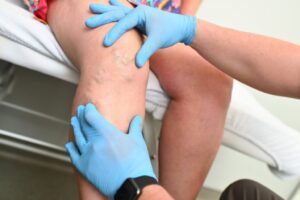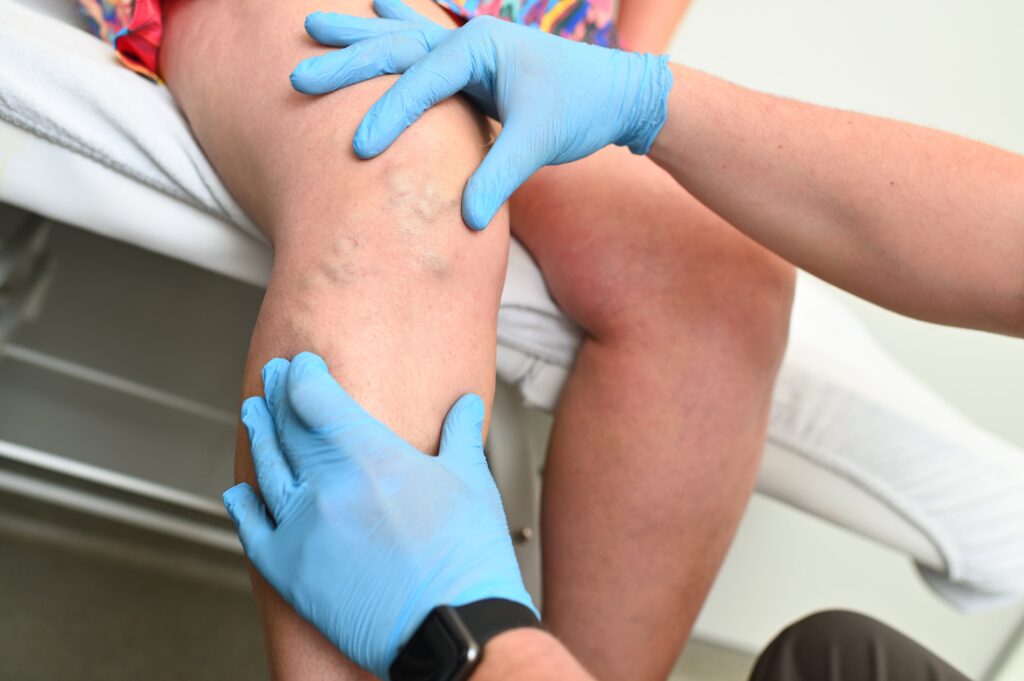Could Your Achy Legs Be Signaling Deeper Vein Issues?
 Many of us are all too familiar with the feeling of tired, achy legs at the end of a long day. Whether from standing for hours on end, sitting at a desk, or just being on our feet constantly, leg discomfort is an experience shared by people worldwide. However, what many don’t realize is that these aches can be a sign of a more serious problem: vein disease. In this article, we’ll explore the impact of vein disease on your body and why it’s important to seek treatment if you suspect you’re suffering from it.
Many of us are all too familiar with the feeling of tired, achy legs at the end of a long day. Whether from standing for hours on end, sitting at a desk, or just being on our feet constantly, leg discomfort is an experience shared by people worldwide. However, what many don’t realize is that these aches can be a sign of a more serious problem: vein disease. In this article, we’ll explore the impact of vein disease on your body and why it’s important to seek treatment if you suspect you’re suffering from it.
What is Vein Disease?
Vein disease encompasses a wide range of venous disorders, including varicose veins, spider veins, and more. This condition occurs when the valves inside our veins stop functioning correctly, leading to improper blood flow and, in turn, vein dilation. This dilation puts pressure on surrounding tissues, resulting in pain, swelling, and, ultimately, physical changes to the skin on affected areas such as the legs.
Symptoms of Vein Disease
While aching and fatigue in the legs are by far the most common symptoms of vein disease, the condition can lead to a range of additional physical symptoms, including visible veins, skin discoloration, and even ulcers. This range of possible symptoms can make it difficult to identify vein disease in its early stages, leading many to ignore the aches and pain until it worsens.
Who is at Risk?
While vein disease can affect anyone at any age, studies suggest that individuals over the age of 50, those who are genetically predisposed to the condition, and individuals who lead a sedentary lifestyle are more likely to suffer from vein disease. Additionally, those who are pregnant, suffer from obesity, or have a history of blood clots are at an increased risk of developing vein disease.
Treatment Options
Fortunately, there are a range of vein disease treatment options available to those suffering from the condition. These range from minimally invasive procedures that allow for a quick recovery to more comprehensive, surgical treatments that may be recommended based on a patient’s specific condition. In either case, it’s important to seek the guidance of a trained vein specialist to identify the best course of action for your specific condition.
Preventing Vein Disease
While it’s impossible to completely prevent vein disease, there are steps we can take to lower our risk factors. Maintaining a healthy weight, keeping active, and practicing good blood circulation habits such as stretching throughout the day can all help reduce our chances of developing vein disease. By making these simple changes and seeking professional treatment when needed, we can ensure a healthier, more comfortable future for our legs and overall well-being.
Experiencing Achy Legs?
In conclusion, if you’re experiencing frequent leg aches, it’s important to consider the possibility that they could be signaling a deeper vein disease issue. By understanding the causes and symptoms of vein disease, seeking professional treatment, and practicing healthy habits, we can help reduce our risk of developing this condition and enjoy a more comfortable, active lifestyle.
Don’t wait until the aches become unmanageable; speak with a trusted vein specialist such as Dr. Mark Zuzga, D.O. of The West Florida Vein Center, today to learn more about your options. 727-772-3233. www.WestFloridaVeinCenter.com.


 Under the expert guidance of our Board Certified Vascular Surgeon, Dr. Mark Zuzga, our team of Vein Specialists & Vascular Experts are committed to delivering top-tier outpatient vascular & vein evaluation and treatment throughout the greater Tampa & West Florida surrounding areas. Should you find yourself dealing with leg pain, swelling, ulcers, discoloration, or the appearance of spider and varicose veins, we invite you to request a screening today
Under the expert guidance of our Board Certified Vascular Surgeon, Dr. Mark Zuzga, our team of Vein Specialists & Vascular Experts are committed to delivering top-tier outpatient vascular & vein evaluation and treatment throughout the greater Tampa & West Florida surrounding areas. Should you find yourself dealing with leg pain, swelling, ulcers, discoloration, or the appearance of spider and varicose veins, we invite you to request a screening today